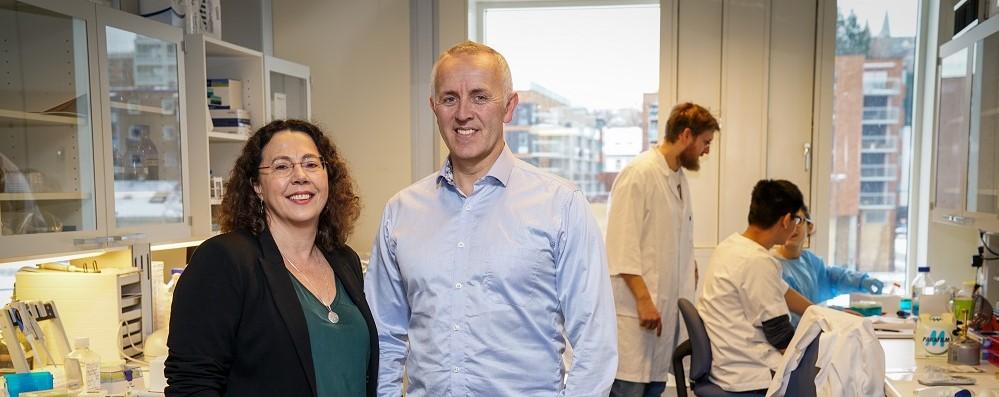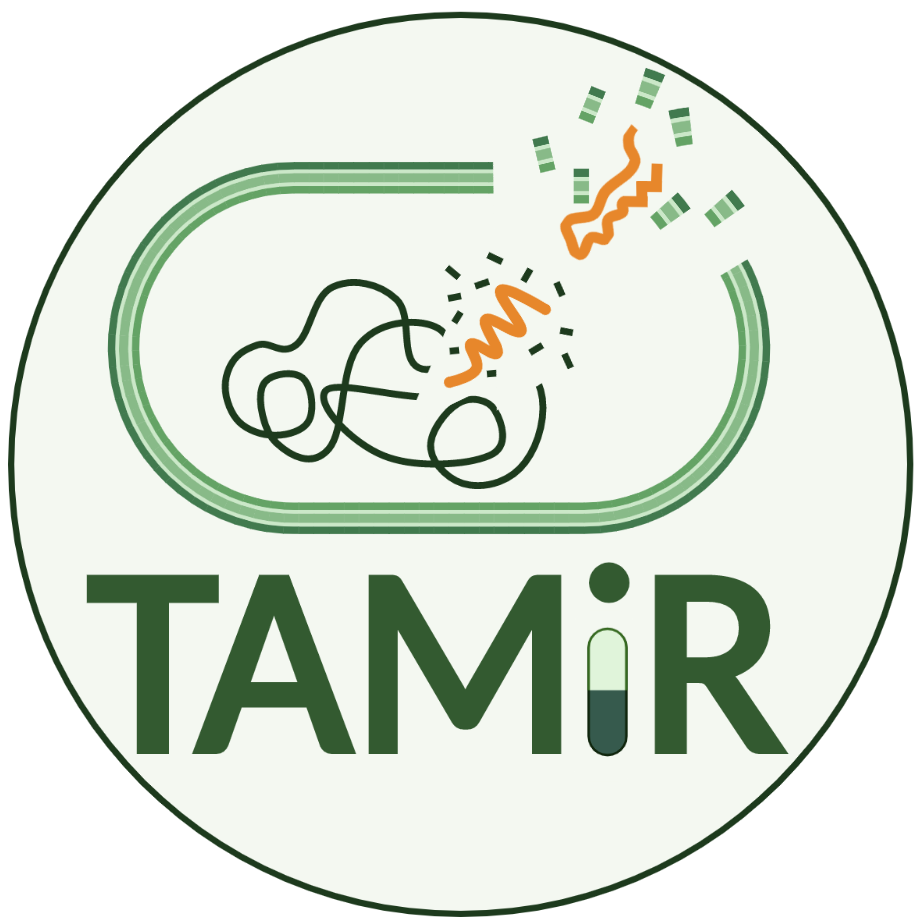TAMiR
TAMiR

The focus of the project titled Targeting antimicrobial resistance (AMR) by inhibition of bacterial stress responses (TAMiR) is to develop antibacterial peptides and small molecules as new antibiotics that can target multidrug resistant bacteria and inhibit antimicrobial resistance.
The TAMiR project is one of the four AMR-related projects funded by the Trond Mohn Foundation (TMS) , and is led by Professor Marit Otterlei.
The TAMiR project is a collaboration between research groups at NTNU, Oslo University Hospital, and the University of Copenhagen, and is branched into research on three different potential new antibiotic drugs.
Research Topics and Publications
TAMiR research topics and publications
The APIM-peptide
The APIM-peptide
Our lead peptide, the APIM-peptide, targets DNA sliding clamps. DNA sliding clamps are functionally and structurally conserved in all three domains of life. The bacterial DNA sliding clamp, the β-clamp, is essential for DNA replication and translesion synthesis (TLS). The APIM-peptide binds to the β-clamp and blocks protein interactions important for the execution of these processes. The APIM-peptide efficiently reduces the growth of both gram positive and gram negative bacterial strains as well as biofilm forming and multidrug-resistant bacteria.
We have demonstrated in vivo effects in an MRSA skin infection model and an MRSE bone graft infection model where the APIM-peptide was applied as a gel or in cement, respectively. Importantly, bacteria are killed at doses that are not toxic to human cells, supporting it´s potential for clinical development as an antibiotic. Additionally, the APIM-peptide strongly inhibits mutagenesis, and these anti-mutagenic properties of the APIM-peptide could be important to inhibit the development of antimicrobial resistance when combined with other antibiotics.
We are currently focusing on optimizing the APIM-peptide for increased affinity to the β-clamp, elucidating its mode of action in bacterial stress responses and on selecting a clinical indication for further development of the APIM-peptide as a new “antibiotics”.
Latest publications
- The bacterial DNA sliding clamp, β-clamp: structure, interactions, dynamics and drug discovery , Cellular and Molecular Life Sciences, May 2024
- SOS genes are rapidly induced while translesion synthesis polymerase activity is temporally regulated, Frontiers in Microbiology, Mars 2024.
- Activation of multiple stress responses in Staphylococcus aureus substantially lowers the minimal inhibitory concentration when combining two novel antibiotic drug candidates, Frontiers in Microbiology, September 2023.
- Survival of Escherichia coli after high-antibiotic stress is dependent on both the pregrown physiological state and incubation conditions, Frontiers in Microbiology, March 2023.
- Optimized Fast Filtration-Based Sampling and Extraction Enables Precise and Absolute Quantification of the Escherichia coli Central Carbon Metabolome, Metabolites, January 2023
- Broad-Spectrum Antibacterial Peptide Kills Extracellular and Intracellular Bacteria Without Affecting Epithelialization, Frontiers in Microbiology, November 2021.
- Nucleoside ANalogues Are Potent Inducers of Pol V-mediated Mutagenesis, Biomolecules, June 2021.
- Novel Peptides Targeting the β-Clamp Rapidly Kill Planktonic and Biofilm Staphylococcus epidermidis Both in vitro and in vivo, Frontiers in Microbiology, 17 March 2021
- Peptides containing the PCNA interacting motif APIM bind to the beta-clamp and inhibit bacterial growth and mutagenesis, Nucleic Acids Research, 04 June 2020
Contact
The project on the APIM-peptide is led by Professor Marit Otterlei
TA-peptides
TA-peptides
The toxin-antitoxin (TA) systems are widely distributed in bacteria and consist of small genetic elements; a stable toxin and its unstable neutralizing conjugate antitoxin. During stressful conditions, the antitoxin is degraded, leaving free active toxin. Toxins can interfere with essential cellular processes such as DNA replication, translation and cell wall synthesis, and enable bacteria to survive stress by inducing bacterial persistence, biofilm formation and antibiotic tolerance.
However, overexpression of toxins can be lethal to the bacterial cell, and this property can be exploited for antimicrobial purposes. We are currently studying the mode of action and antimicrobial effects of peptides derived from type I TA systems, which interact with the inner membrane and have the potential for development into antimicrobial therapeutics.
Contact
The TA-peptides project is led by Professor Magnar Bjørås
Small molecule peptide mimickers
Small molecule peptide mimickers
We are screening for small molecule peptide mimickers that have high affinity for the β-clamp/peptide complex in an in silico virtual screen using a crystallized β-clamp protein and about 5 million commercially available compounds and drug-like molecules.
The most potent candidates will be further studied for potential use as antibiotics.
Latest publications
- Halogenated Pyrrolopyrimidines with Low MIC on Staphylococcus aureus and Synergistic Effects with an Antimicrobial Peptide, Antibiotics, July 2022.
- Synthesis and Evaluation of Fused Pyrimidines as E. coli Thymidylate Monophosphate Kinase Inhibitors, Chemistry Select, December 2021.
Contact
The project is led by Professor Bård Helge Hoff and Associate Professor Eirik Sundby
Media Coverage
- Slik forsvarer E. coli seg mot antibiotika (gemini.no), Gemini, juni 2024
- Kan ha funnet løsningen på et alvorlig helseproblem: – Dette er helt unikt - adressa.no, Adressa, April 2024
- Ny metode baner vei for nye antibiotika (gemini.no), Research news from NTNU and SINTEF, December 2023
- Har utviklet antibiotikum med ny virkningsmekanisme, statement in Dagens Medisin, September 2023
- I dag - Ekko - NRK Radio, Podcast, P2, NRK radio, August 2022
- Hvorfor utvikles det ikke nye antibiotika? (aftenposten.no), chronicle, Aftenposten, August 2022
- Forskningspodden: Hva skal vi gjøre når antibiotika slutter å fungere? , Podcast-episode i Forskninspodden, July 2022
- Nå skal abonnement på antibiotika testes ut (gemini.no), Podcast «De store spørsmålene», February 2022
- Nummer 2 - pest-POSTEN (pestposten.no), magazine for members of Norsk Forening for Infeksjonsmedisinere, 2021
- NRK Radio Ukeslutt, 27.06.2020
- Norske forskere med oppsiktsvekkende oppdagelse – kan ha funnet ny type antibiotika, NRK Trøndelag 24.06.2020
- Norske forskere med nytt antibiotika-funn, NRK Vestland, 21.02.2019
AMR-bridge
AMR-bridge is a consortium for the four AMR-projects in Norway founded by Trond Mohn Foundation. AMR-bridge arrange an annual meeting in order to increase the awareness of the AMR-problem, underline the importance of research and promote research collaboration.

